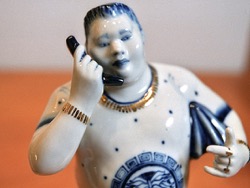
The habit of swearing, as a rule, does not speak anything good about a person, but of battle and there are some unexpected advantages, says BBC Future columnist.
I grew up with a sister who is significantly older than me. Therefore it is not surprising that already for ten years I knew how to swear like a trooper.
And it’s still pretty late: a recent study showed that children start to swear from the age of six, if not sooner. Swearing is on average about 0.5-0.7% of all speech – that is the day the average person can speak to a few dozen obscene words, depending on individual talkativeness.
Areal swearing – in the words of those who are not inclined to it – exposes the person’s ignorant, rude and not trustworthy.
About the same in childhood taught us moms. But battlefield can be an upside: it helps us to convey thoughts more clearly and… the pain can be eased.
It is not excluded that swearing activates other parts of our brain than the rest of the vocabulary.
According to Richard Stevens, author of the book “White crow: why it’s good to be bad”, the brain processes language differently than ordinary speech. In the last meet of the cerebral cortex and some specific areas in his left hemisphere, while language associated with a more evolutionary ancient and primitive parts of the brain.
“People with aphasia (impaired speech formed), there is typically damage to the left hemisphere of the brain and difficulty with speech. But there are also many described cases of aphasia, in which patients can quite freely use of stereotypical language – that is, to sing the songs or swearing,” says Stevens.
“Studies of patients with Tourette’s syndrome, which is sometimes observed impulsive attraction to battle, give reason to believe that swearing is associated with the deeper parts of the brain – with its subcortical nuclei”.
Needless to say, the set of words recognized obscene, varies from culture to culture.
In English, the verbs swear and curse for the process of pronouncing warfare, also mean “to swear” and “curse” that tells us about the religious roots of the taboo vocabulary of English.
In the middle ages to the Englishman especially offensive sound just the curse associated with religion, and quite harmless by today’s “damn” (damn), says Melissa Mohr, author of the newly released book by obscene curses.
But the rough words for intimate body parts, was perceived as much safer. They appeared in the names of streets and names. “There is evidence that people, it’s not jarred, says Moore. – In overcrowded conditions, in the actual absence of personal space, people saw each other naked more often than now. Therefore, parts of the body was considered not such a taboo”.
According to Moore, things changed in the Renaissance when a more offensive began to recognize swear words with sexual connotations.
“But there is not happened the Protestant revolutions, a coarser still considered to be a religious curse,” says she.
That is, insult to religious figures (and even artifacts), say, in Spain or in Italy is still regarded as a strong expletive.
In Asian cultures many curses associated with social status, ancestors, and a matter of saving face.
“According to popular myth, in the Japanese language supposedly has no swear words, says Mohr. But in Japanese there are words for almost any aspect of sex or bowel movements, and, in addition, a lot of offensive language related to loss of face. So in Japanese the word “fool” – the tank sounds much more offensive than in English.”
“Japanese you can offend a multitude of different ways, so there is no need for many mothers to convey to him the extent of your indignation”.
In sign language demonstration of additional words takes time, so use other techniques – for example, changing the sequence of characters you can bring into the proposal a tinge of vulgarity or change the meaning of the word.
“For example, many harsh words are associated with touch of the nose – such as “ugly”, “boring”, “snob” or “to urinate,” explains Donna Jo Napoli, Professor of linguistics from Swarthmore College in the U.S. state of Pennsylvania. – Therefore, a touch to the nose is a way to add it in meanness.”
Another example is the double touch thumb to your chin with delayed middle finger indicates rough action with the participation of the mother of the interlocutor, as a similar gesture with all fingers extended means simply “mother”.
To sound more convincing
During recent research it was found that swearing may also be beneficial. The most obvious advantage – it helps to better convey the idea.
Vvorachivaya harsh words, we transmit not only the meaning of the sentence, but also our emotional reaction.
This allows us to Express anger, disgust or pain or to show the person our desire that he stay away – without resorting to physical violence.
Image copyright Thinkstock
Image caption In Asian cultures a person can be insulted in many different ways
Scientists have found that swearing can increase the effectiveness and credibility of the transmitted information, especially if it is used to Express pleasant surprise. This may apply even to political figures.
In 2014 published the results of a study in which the subjects were asked to read blog entries of a fictional politician.
It turned out that the records that contain swear words, perceived reading as less formal and are forced to consider the author with more sympathy.
At the same time, the subjects were told that this would not require them to vote for this politician.
Scientists have suggested that these results are specific for expression in the Internet – which is understandable, given that we tend to swear more online than in real life. For example, the study of Twitter was that users of the platform swearing is 1.15% of the text, which is 64% higher than in live speech.
Stevens and his colleagues also conducted a series of experiments that demonstrated that swearing can improve the human resistance to pain.
Students-the subjects, who swore roughly, his hand in a bucket of ice water, could hold out longer than the speaking of the word censorship.
“In addition to the shift of the pain threshold, the subjects also experienced increased heart rate. When a person scolds, he quickens the pulse, which tells us that language itself causes an emotional response, says Stevens. – Thus, the body shows stress response, and it acts as a pain reliever”.
Friendly mutugi
Scientists believe that the usefulness of swearing for skill depends on how Taby, from his point of view, is considered to be a particular word.
And this, in turn, is usually determined by how much the man scolded in your childhood for the use of such words.
The 2013 survey showed that people who in childhood were more often punished for cursing, show more pronounced galvanic skin response (it is associated with physiological arousal) while reading aloud a list of obscene words in the laboratory.
Contrary to popular belief, swearing may designate and friendly attitude.
For example, the new Zealand experts from Victoria University in Wellington studied the use of the word “b***” in the communication worker of a soap factory.
It was found that workers are regularly insulting each other within their teams, but in dealing with other teams were more restrained.
The researchers concluded that in this work context rude the word was associated with the expression of solidarity and was used to rally the brigade, reducing tension in it and for the equation of people with different degrees of responsibility and authority.
Skvernoslovit, they seem to be saying: “I’m so good you know you can afford with the language when communicating with you.”
In General, profanity seem to have some benefit. But that speaks of the human habit of swearing obscenely?
Most of us from personal experience know why you should keep language in dealing with the head or with grandma: swearing produces a bad impression.
During surveys conducted in 1970-ies, matermania were rated as less competent and less trustworthy.
In five-factor model of personality, the frequency of using foul language to be positively correlated with neuroticism, extraversion and openness to new experience, and negatively with benevolence and integrity.
Fortunately, the case is not limited.
A recent study was generally defeated the myth that the tendency to war is poverty of speech, lack of good education and belonging to lower social strata.
Timothy Jay and his colleagues found that profanity in General is correlated with overall flexibility of speech and is not associated with lack of vocabulary.
Stevens in the already mentioned book “White crow” highlights the findings in 2004 the specialists of Lancaster University in Britain: in a class society, the frequency of using obscene language in General, the lower, the higher the class, but well-off middle classes swear more than the not so wealthy.
It seems that at some point people stop to think about the kind of impression they make.
“At social events, where everyone behaves politely exaggerated, it may be a situation when nobody really communicates, and nothing interesting will happen,’ says Stevens. And if you think that then you can swear clicking, it might help to break the ice”.
Do not ignore another aspect.
“Taboo words are at all, says Moore. – Swearing helps us to meet basic human need”.
So do not particularly hold back, when will I stop myself on the thumb with a hammer.








